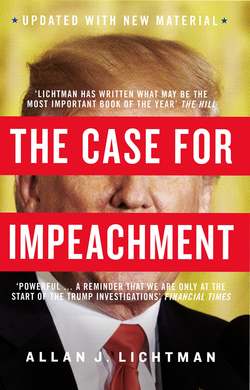Читать книгу The Case for Impeachment - - Страница 22
CHAPTER 2 The Resignation of Richard Nixon: A Warning to Donald Trump
Оглавление____________
This is the operative statement. The others are inoperative.
—Richard Nixon press secretary Ron Ziegler, April 17, 1973
You’re saying it’s a falsehood. And they’re giving—Sean Spicer, our press secretary—gave alternative facts.
—Donald Trump senior advisor Kellyanne Conway, January 22, 2017
In a retrospective on the Nixon scandals forty years after the Watergate break-in, Woodward and Bernstein conceded that “Nixon was far worse than we thought.” Even early in his presidency, Donald Trump exhibits the same tendencies that led Nixon to violate the most basic standards of morality and threaten the foundations of our democracy. Both Nixon and Trump exhibited a determination to never quit, to win at all costs, to attack and never back down, and to flout conventional rules and restraints. But as ambitious and headstrong as they were, they also shared a compulsion to deflect blame, and they were riddled with insecurities. They exploited the resentments of white working class Americans and split the world into enemies and loyalists. In the first month of his presidency, Trump talked more about “enemies” than any other president in history. Neither man allowed the law, the truth, the free press, or the potential for collateral damage to others to impede their personal agendas. They cared little about ideology but very much about adulation and power. They had little use for checks and balances and stretched the reach of presidential authority to its outer limits. They obsessed over secrecy and thirsted for control without dissent.
The establishments in New York and Washington and at the elite universities viewed the two men with distaste throughout their long careers. In turn, these professed populists scorned a cultural elite of mainstream journalists, Hollywood celebrities, revered politicians, and Ivy League professors. When first elected president, Nixon had commanded his aides, “No one in Ivy League schools to be hired for a year—we need balance—trustworthy ones are the dumb ones.” But “trustworthy” to whose benefit? Certainly not to the American people, who’ve put their welfare in the hands of that government meant to represent their—and not its own—best interests. So far, with few exceptions, Donald Trump has avoided Ivy League professors for cabinet or top staff positions in his administration.1
Long after he resigned the presidency, Richard Nixon confessed to an intense admiration of Donald Trump. To the magnate in 1987, he wrote: “Whenever you decide to run for office you will be a winner!” Trump proclaimed that he would hang Nixon’s “amazing” letter in the Oval Office.2
In 1974, two years after winning a landslide reelection victory, Nixon avoided near certain impeachment and removal by becoming the only American president to resign the office. Nixon’s story is the cautionary tale for Donald Trump.
